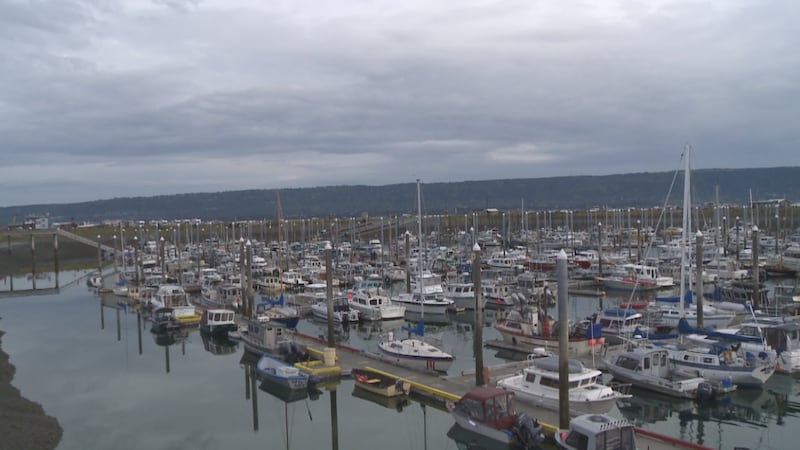Anchorage Assembly considers broader sales tax, along with approving 2 tax-related ballot measures
Next Assembly meeting is slated for Mar. 4
ANCHORAGE, Alaska (KTUU) - Along with approving measures for the upcoming Municipal Election ballot, the Anchorage Assembly is back to considering a new municipal sales tax, which again became a focus of a series of back-and-forth debates at this week’s meeting of the body — the first of 2025.
Two separate ballot measures were passed Tuesday. The first, which passed the full body, puts to voters the question of whether or not a special levy tax should be implemented in order to help cover the costs of acquiring police vehicles. The cost to taxpayers, if passed, would be approximately $3 million.
The second, which also passed unanimously, will allow voters to decide whether or not a special tax levy should be implemented to cover the costs of Anchorage service fleet vehicles. This would cost taxpayers a total of about $3.5 million, if passed.
The economic effect summary sheets of both measures, which indicate sponsorship by Anchorage Mayor Suzanne LaFrance, state the funding will improve the municipality’s “overall operational efficiency, at a very small cost per individual.”
In order to pass, the majority of voters who turn out for April’s election would have to support either measure.
Separately, the public will have another opportunity to speak on multiple versions of a proposed sales tax ordinance.
Members of the Assembly and the public had much to say Tuesday night about the five different versions of the ordinance related to a proposed 3% sales tax, particularly when it comes to how the money garnered via that tax might be used. As of now, the versions each combine a sales tax — to help fund municipal area projects — with a “proportionate” property tax reduction; some versions allocate portions of the money from the tax to snow services, public safety and other efforts.
Even before discussions about which version might become a possible ballot measure, however, came the votes to decide whether or not the Assembly would give itself more runway to consider each proposal and make Nov. 30 the deadline for holding a special election, versus attempting to put a tax measure on the April 1 ballot.
Member Anna Brawley, like some of her counterparts, pushed for the extra time for the ordinances to be worked through and reviewed by the public.
“I don’t think that we should feel tied to only the regular [municipal] election cycle,” Brawley said, “because the reality is that, if we do that, no matter what, we need to decide this for the April ballot. That gives us two weeks from right now.”
Others, such as Assembly Member George Martinez, said they recognize that there could be additional opportunities for education and understanding through an extension, but expressed concern over additional delays.
“I know this is to the question of the delay,” Martinez said, speaking to the vote on a Nov. 30 deadline for a potential special election, “but fundamentally, if we’re delaying, and we don’t have a counterpart that is saying, ‘We honor your work, we recognize the work you’re doing is valid toward making a better idea,’ then what are we really waiting for?
“Let’s let the champions bring their ideas forward,” he said, “and let the voters have their say.”
While the first vote to make Nov. 30 the deadline for a possible special election failed, a re-vote led to the passage of the resolution, meaning that if a ballot measure is eventually approved, a special election on it would take place by the end of this November.
From there, the Assembly moved on to considering versions of the ordinance that would — if passed — establish a ballot measure for a proposed municipal tax, to be decided upon by a vote of the people later this year.
Most of those testifying on Tuesday opposed all versions of the sales tax ordinance, but others were vehemently supportive of the Assembly’s efforts to get one on the ballot, with some choosing a particular version to favor.
“As a longtime Alaskan and mother of six,” said an Eagle River woman in support of the substitute version of the ordinance, “this proposal is a great opportunity to re-inject a new vibrancy into our community, with both current residents and also investing in a better future for our children and grandchildren.”
A local business owner said that while she understood the main purpose of the ordinance — which Assembly members have stated is to provide property tax relief while also funding municipal projects — she was especially concerned about what a sweeping tax could mean for entities like hers.
“This tax threatens to increase costs for consumers, pushing them to seek products in the unregulated black market,” said Enlighten Alaska co-owner Leah Levinton. “A market that doesn’t contribute to our city’s revenue through tax contributions, doesn’t ensure safety or quality measures, et cetera. Cannabis business — just speaking to that, that’s my world — it’s critical to our local economy.”
Some public testifiers said they were pleased to see the Assembly taking care to craft proposals that could be viable in voters' eyes.
“Not an easy set of challenges,” one speaker said, “but I think it’s possible, and I am pleased you’re going to have the time to do a job that will be difficult, but is extremely important.”
Extensive public testimony was taken Tuesday night; additional public hearing on tax items was continued to March 4.
The regularly-scheduled meeting of the Anchorage Assembly will begin, per usual, at 5 p.m. that evening.
A brief description of each of the versions of the tax measure ordinance is viewable on the municipality’s website. You can also see documents in full and view Tuesday’s meeting here.
Anchorage’s Regular Municipal Election is slated for April 1, 2025.
Editor’s note: This story has been updated.
See a spelling or grammatical error? Report it to web@ktuu.com
Copyright 2025 KTUU. All rights reserved.














